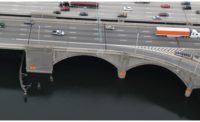The Dept. of Transportation has awarded $500 million to 39 highway, bridge, rail, port and other pojects in its seventh round of Transportation Investment Generating Economic Recovery, or TIGER, grants.
In all, 34 states are represented among the winners, which DOT Secretary Anthony Foxx formally announced on Oct. 29.
As with past TIGER rounds, the 2015 competition was intense, with 627 eligible applications submitted, seeking a total of $10.1 billion for the $500 million DOT had available.
Foxx told reporters in a conference call, “As transportation dollars dwindle at the federal level, TIGER is increasingly becoming the escape valve for projects that are looking for dollars. And that’s why I think you see so much interest in the TIGER program.”
Foxx adds that more and more TIGER applications are for road resurfacing or bridge repairs. He notes that those are “critical and urgent needs, but needs that are typically handled through the normal allocation of federal highway and aid dollars.”
Road projects accounted for 30% of the TIGER dollars awarded, transit projects received 29%, followed by passenger rail at 14%, freight rail, with 10%, maritime 9% and bicycle-pedestrian infrastructure 7%.
Among the grants was $16 million to New Jersey Transit for preliminary work towards a proposed replacement for the 105-year-old Portal Bridge, which carries rail lines across the Hackensack River.
Foxx also pointed out that 17 of the 2015 winners, or 43%, were rural projects, the largest share in the six-year-old program. Foxx says, “We saw this year a higher percentage of rural projects that showed some transformative value that cut above the day-to-day and actually suggested a level of vision about how rural communities can seize opportunities for people.”
South Dakota, for example, won a $6-million TIGER grant to help fund $12.4 million in freight rail improvements. Gov. Dennis Daugaard [R] said on the conference call that some of the money will go for upgrading 10 miles of rail near Huron. When the work is finished, it will allow train speeds of 40 miles per hour, up from just 10 mph now.
Congress did specify that at least $100 million of the 2015 TIGER money must go to rural projects. DOT exceeded that benchmark, approving $187.5 million in rural grants this year.
News of some of the selections broke in the days before DOT’s announcement, as the department notified senators, House members and other officials about winners in their areas. Those officials then issued press releases hailing the decisions.
A TIGER grant can cover no more than 80% of a project’s total cost. The grants are pieces of multi- financing packages that also include state or local government or private-sector funding.





Post a comment to this article
Report Abusive Comment